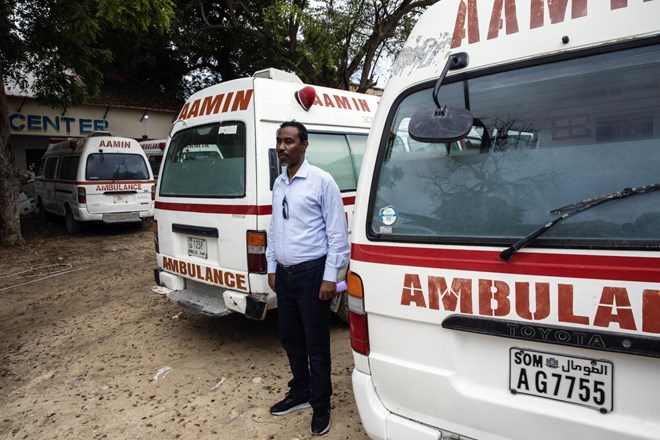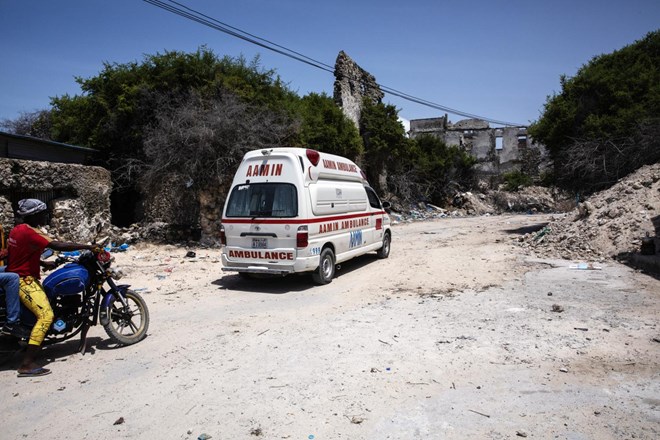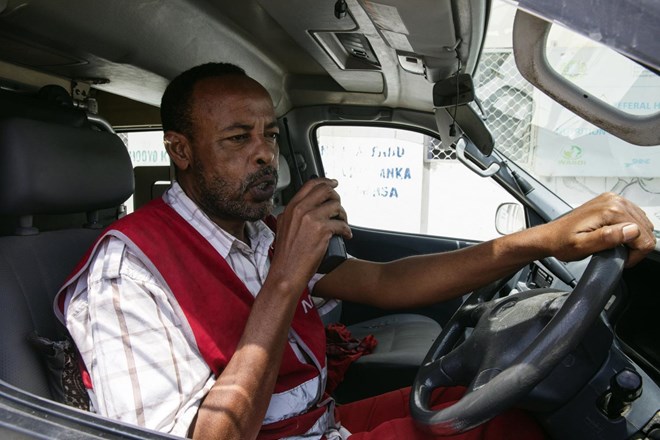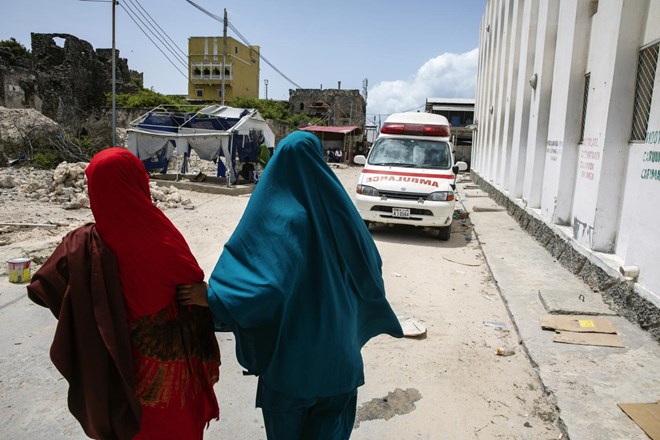
Sunday June 5, 2022
Dismayed that victims of the incessant violence in Somalia's capital were being rolled to hospitals on wooden carts and in wheelbarrows, a dentist decided to do something about it
Dr Abdulkadir Abdirahman Adan, the founder of Aamin Ambulance. photos: MALIN FEZEHAI/nyt
On the way to and from his dental clinic every day, Dr Abdulkadir Abdirahman Adan was appalled by an all-too-common sight: severely injured and dead Somalis being transported to hospitals in wooden hand carts or wheelbarrows.
This was in 2006 in Somalia's capital, Mogadishu, when government troops, bolstered by Ethiopian forces, were engaged in a brutal war with Islamist fighters that saw thousands of people killed and many more mutilated in the violence.
Dr Adan, who had just returned to the city from studying abroad and had opened his dental practice in the city's largest open-air market, felt powerless to end the bloodshed. But he thought he could do something to help still-living victims get treatment faster and make sure the dead were handled with dignity.
His first step was modest: He rented a minibus, painted blue and white in the colour of Somalia's flag, and paid its owners a few dollars a day to carry the injured to safety. People would call Dr Adan or the bus owners on their cellphones to direct them to those in need of aid.
But this approach could help only a handful of victims each day, and the city's violence was only intensifying.
"I thought the situation would get better, but it kept getting worse," he said.
So within months, Dr Adan poured all his savings -- about US$2,400 (82,000 baht)-- into buying a van, with some additional funding coming from a campaign he ran urging university students to donate $1 to save a life.
And so began Aamin Ambulance: the first and still the only free ambulance service operating in the capital of more than 3 million people.
Sixteen years later, Aamin Ambulance -- "Aamin" means "trust" in Somali -- now has a fleet of 22 ambulances and a team of 48 drivers, nurses, paramedics, radio operators and security officers.
"Anyone who is in need of an ambulance, 24/7, we are here," said Dr Adan, 48. "And it is free."
Since Aamin Ambulance was founded, there have been few periods of extended peace in Mogadishu, with al-Shabab, the Somali terrorist group affiliated with al-Qaeda, continuing to carry out frequent attacks. While its deadliest came in 2017 -- a double truck bombing that killed 587 people -- the group remains a constant threat. Just this week, President Joe Biden authorised the deployment of hundreds of US troops to the country on a counterterrorism mission.
The Aamin Ambulance workers are often among the first to arrive at the scene of an attack, often just minutes after a bomb blast.
"We almost always reach before the police come," Dr Adan said.
This has meant that Dr Adan and his team are often the first call for journalists looking to verify the number of casualties and to help fact-check what transpired at the scene of the attack.
But this speed also puts the team at risk: Al-Shabab will sometimes detonate a second bomb in the area of an attack, specifically meant to target those arriving to help.

An Aamin Ambulance driving through Shangaani district in Mogadishu. MALIN FEZEHAI/nyt
Abdulkadir Abdullahi, a nurse with Aamin, has experienced this type of explosion while evacuating casualties, with the windows of the ambulance he was in once shattering from a blast as he prepared to leave a scene. "Just when you think it is safe, it turns out that it isn't," Mr Abdullahi said.
Responding to terrorist attacks is hardly the service's only mission. It also transports sick children, mothers in labour, accident victims and anyone else in need of urgent care. Through its 999 hotline, the team fields a minimum of three dozen calls a day.
It also engages in public health campaigns, including educating people about Covid-19 and providing first-aid training.
Despite recent progress on some fronts, the health sector remains weak in Somalia. There are few public hospitals, and receiving treatment at private facilities is expensive and out of reach for many.
The coronavirus pandemic underscored how vulnerable Somalia's health infrastructure is, with medical workers facing long working hours and lacking protective gear.
Mogadishu is particularly vulnerable to infectious diseases, with many residents living in cramped settlements with unsanitary conditions. Tens of thousands of displaced people, many of them with unvaccinated and malnourished children, continue to flock to the city, presenting a growing health challenge for authorities, who must depend on private groups to deliver the services the government cannot.
"This is why the work that Aamin Ambulance does is indispensable," said Mohamed Adow, director of health at the Benadir Regional Administration, which oversees Mogadishu. "We need more of them."
Dr Adan is not alone in his civic engagement. His work is among many citizen-led initiatives that have sprung up across Somalia since its central government disintegrated in 1991.
For decades, this Horn of Africa nation has been caught between factional wars and terrorism, with successive weak governments unable to fully secure the country or provide key services. But through it all, Somalis have cobbled together some basic services: building schools and universities, establishing thriving telecommunication and banking services, collecting garbage, building streets and even rehabilitating child soldiers.

Abdirizak Mohamed Mumin, a driver with Aamin Ambulance. MALIN FEZEHAI/nyt
"People were the ones who made their own development, their own progress," Dr Adan said.
While Dr Adan and his team have been exposed to the grisly aftermath of many attacks, the twin truck blasts Oct 14, 2017, at a busy intersection in Mogadishu still stand out, with nearly 600 killed and 316 injured.
"It was something that is not good to remember," Dr Adan said.
On that afternoon, he was about five minutes away from the bombing and immediately rushed there to meet his team. "Lots of people were crying, dying, bleeding," he remembered. "It was highly disastrous. It is still like a nightmare in our mind."
But the horrific attack brought much-needed recognition of the ambulance service, among both Somalis and international donors.
In the days after the attack, a crowdfunding campaign for Aamin drew contributions from Somali supermodel Iman and British rock band Coldplay.
Abdi Addow, a Somali Swede, said he helped launch the campaign because he was both moved and surprised that Aamin provided such a public service for free.
In Somalia, he said, "everyone is focused on his own benefit, of making profit out of the poverty and the chaotic systems". But with Aamin Ambulance, "they are the ones that always have the courage to help other people".
Dr Adan said he picked up the spirit of volunteerism and generosity to others from his grandfather, a religious scholar. Dr Adan's father taught the Quran and other religious subjects, and his mother ran a small shop.
Years after finishing high school in the capital, he left Somalia at the turn of the century to study dentistry at Peshawar Medical College in Pakistan. While there, he said, he was inspired by the example of Abdul Sattar Edhi, who had begun Pakistan's largest ambulance service.
Dr Adan's work has not brought him the universal goodwill of the country's authorities, with some questioning if the speed with which his team arrives at attack scenes means they were tipped off in advance. Other officials have expressed suspicions about how he is able to afford to run the service.
Dr Adan dismissed the idea of getting any early attack warnings and said he funds the ambulances through income from his own dental practice, along with support from local companies, the United Nations and other nongovernmental organisations.
Aamin's workers face harassment and even beatings by security forces, who regularly deny them access to pass roadblocks when carrying injured people.
"Security forces put a gun in your mouth and threaten you," said Ali Mohamed, an ambulance driver with Aamin for 14 years. In its decade and a half of operation, three Aamin staff members have died on the job as a result of gunshots or accidents.
So far, the service has not received any threats from al-Shabab, Dr Adan said.
His future ambitions are to offer a free hospice and mortuary service in Mogadishu and to expand the ambulance service beyond the capital, eventually catering to the entire country.
"Somalia and Somalis deserve better," he said.

An Aamin Ambulance is parked outside a clinic in Mogadishu. MALIN FEZEHAI/nyt